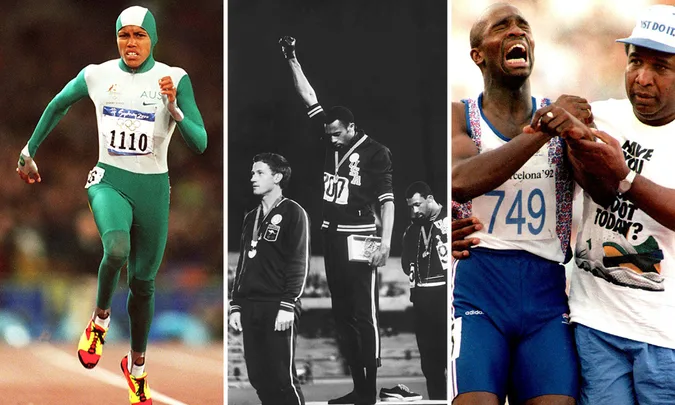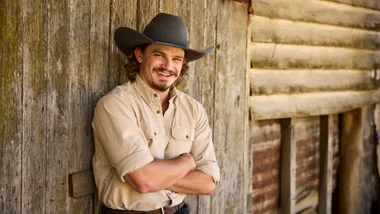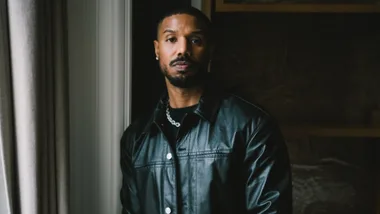It wouldn’t be the Olympics without a bit of drama. And boy have we got some drama for you. We have triumphs, tragedies and tears: all the heartwarming and heartbreaking Olympics moments that are guaranteed to defrost your cold, cold heart. So settle in. BYO tissues. Things are about to get emotional here.
Cathy Freeman wins her first Gold in Sydney, 2000
Let’s start with a classic. There’s not an Australian on the planet who doesn’t know this story – and there wasn’t a dry eye in the stadium when Cathy Freeman soared around the track to win her first Oympic gold medal in the 400M sprint, in front of a homecrowd, roaring her on. But when she took her victory lap, cloaked in the dual Aboriginal and Australian flags, that’s when the waterworks really started.
Derek Redmond gets a helping hand from his father in Barcelona, 1992
In the middle of his 400M sprint semi-final at the 1992 Barcelona Olympics, British sprinter and medal favourite Derek Redmond tore his hamstring, falling to the track and crying out in pain. After a moment, he gets back up and starts hopping to wards the finish line, determined to finish his race. Out of nowhere, his father, breaks past security to run on to the track, putting his arm around his son and helping him limp towards the finish line. We have tears in our eyes just writing this sentence. For many, it’s one of the purest symbols of the Olympic spirit: courage, determination and resilience, of the heroism in the tragedy of pushing desperately towards the finish line.
In the footage you can see officials coming up to Redmond and his father Jim, telling them to get off the track. Jim bats them away (Redmond would later admit he used a few choice four-letter words). Ultimately, Redmond was disqualified for competing with assistance. But that doesn’t matter. The world remembers his show of determination, and a father’s love for his son.
John Carlos and Tommie Smith raise the Black Power salute in Mexico City, 1968
Many people know the story behind this iconic image: two black sprinters, Tommie Smith and John Carlos, are standing on the podiums, receiving their gold and bronze medals respectively, with their heads bowed and their hands in a black glove, defiantly symbolising black power. At the time, the US was in the middle of its civil rights protest movement and Martin Luther King had been assassination and Malcolm X’s Black Power movement was gaining momentum. But after Smith and Carlos’ very visual process, the pair were booed, lambasted in the American press, kicked out of the relay team and there were calls for their suspension from the Olympic village and the US team.
What many people don’t know, however, is the story of the third man on that podium. His name was Peter Norman, and he was an Australian sprinter who won a silver medal in that race. He also wore an Olympic Project for Human Rights badge on the podium, and told Carlos and Smith that he would stand with them proudly on the podium. The three athletes remained close friends their whole lives, and in 2006, Carlos and Smith made the journey to Melbourne to be pallbearers at his funeral.
Eric the Eel wins hearts in Sydney, 2000
Okay, now for something completely different. The reason this video will make you cry is because it is truly heartwarming: an athlete giving it his all in the spirit of the Olympic games. Eric Moussambani, from Equatorial Guinea, was the most unforgettable competitor at the Sydney 2000 Olympic games when he first dove into the pool. 12 months prior to his 100m freestyle event, he couldn’t even swim, had never even seen an Olympic-sized 50m pool, and he had never even set foot outside of his birth country. He gained entry to the games on a wildcard, no longer available, that allowed athletes from developing nations to take part in the Games. When his two competitors false-started, he was told he would have to swim alone, and that he did: struggling through his 100m like a champion, and although he didn’t make the qualifying time of 1.10 minutes, he still officially ‘won’ his heat, and emerged from the pool a minor celebrity. It wasn’t a great triumph or a terrible tragedy, but it was a heartwarming tale of the underdog.
Kerri Strug lands on one ankle, clinching the gold in Atlanta, 1996
Triumph over adversity is what makes the Olympics so compelling, why else do we get up at three in the morning to watch synchronised diving heats if not to see stories of success writ large? In 1996, the one that gripped a nation was American teenage gymnast Kerri Strug, who injured her ankle in a botched landing during a Vault heat in the women’s team all-round event. Her team made it to the final, and instead of bowing out in the Vault event, Strug decided to jump again, and not only did she perfect her twisting routine, she landed perfectly… on one ankle. She immediately fell to her knees and crawled off the matt. But it was enough, her perfect routine landed the US team a Gold medal. Krug had to be carried to the podium by her coach, but her grinning, ecstatic face says it all.
Nadia Comaneci scores a perfect 10 in Montreal, 1976
While we’re on the topic of gymnastics, no list of spectacular moments would be complete without a mention of Nadia Comaneci. Aged just 14, this pint-sized Romanian gymnast wowed the world when she scored a perfect 10 – a never-before-achieved feat, and no longer possible today with the changes in scoring methods – on the uneven bars. Maybe this won’t make you cry, but it will make you gasp.
Kieren Perkins triumphs from lane 8 in Atlanta, 1996
Is there a better Australian story than this? An epic comeback, an underdog gone good? Kieren Perkins was already an Olympic champion when he barely scraped into the final of the 1500m freestyle in Atlanta, 1996. He was relegated to lane 8 – the worst lane – where races are seldom won and frequently lost. But Perkins stunned commentators, onlookers and his competitors when he leapt gracefully into the pool into the first place, and powered on throughout the race to win a well-deserved and mind-blowing second gold medal. The Australian commentators could not believe it, repeating over and over again “I can’t believe it.” The stuff that great films are made of.
Steven Bradbury sails through in Salt Lake City, 2002
They call it ‘Doing a Bradbury’: letting your opponents make a fool of themselves, and when they stumble and fall, sailing through to seal the deal. And that’s exactly what speed skater Steven Bradbury did in Salt Lake City in 2002, coming from behind on the final bend, when all the other competitors had slipped on a turn to glide gracefully across the finish line to clinch Australia’s first Winter Olympics gold medal. Triumph surely doesn’t get any sweeter than that. Marvelous stuff. And that’s why Bradbury is the only Winter Olympian who will appear on this list.
Jane Saville falls short just before the finish line in Sydney, 2000
Does anyone really understand the rules of walking? Not us, and yet we can’t stop watching it, something about the strange, irregular motion of movement. It’s compelling, trust us. Anyway, back in 2000 at the Sydney Olympics, Australian walker Jane Saville was the favourite to take home the Gold, and after enduring almost 20km of walking across Sydney, had entered the Olympic stadium for the final leg of the race. But just 200m shy of the finishing line, a judge appears in her path waving a red flag. She had been disqualified. The unbridled, unfiltered anguish on her face as she realised her Olympic dream this time around was over is enough to move anyone to tears.
Matthias Steiner dedicates his gold to his wife in Beijing, 2008
German weightlifter Matthias Steiner had promised his wife he would win a gold medal at the Beijing Olympic Games, and that she would be there to see it. Tragically, she died in a car accident in 2007 and Steiner considered giving up the sport forever. Instead, he went to Beijing where he was crowned the strongest man in the world, lifting a weight ten kilograms heavier than he had ever lifted, aloft. But it’s Steiner’s reaction that will really have you sobbing into your morning coffee: raw and emotional, he sobs into the matt, kisses his weights, weeps in the arms of his coach and jumps up and down, pointing at the German flag on his leotard. It’s emotional stuff. We’ve known more than a few grown men to get a bit sniffly at the sight of this video.
Liu Xiang falls at the first hurdle in Beijing, 2008
In 2008, Liu Xiang was a legend in his home country of China: after winning a gold medal in the 110m hurdles in Athens, 2004, he cruised into Beijing not only a crowd favourite, but a torch bearer and with a hometown advantage to boot. There wasn’t a man, woman or child in China who wasn’t cheering for Xiang in this race. Which is what makes what happens next all the more tragic. Almost immediately after the gun fires, right before the first hurdle, Xiang pulls up, gripping his Achilles tendon, limping off the track with his head bowed, with the entirety of the stadium staring on, shocked. Four years later, when he returned to the Olympic stage in London, he fell at the first hurdle, tearing his Achilles tendon again. At the risk of sounding like terrible clickbait, what happens next will MAKE. YOU. CRY. Xiang gets up and hops the length of the track, pausing to kiss the final hurdle. His fellow athletes come to his rescue, placing their arms around him, helping him hobble over the finishing line.










